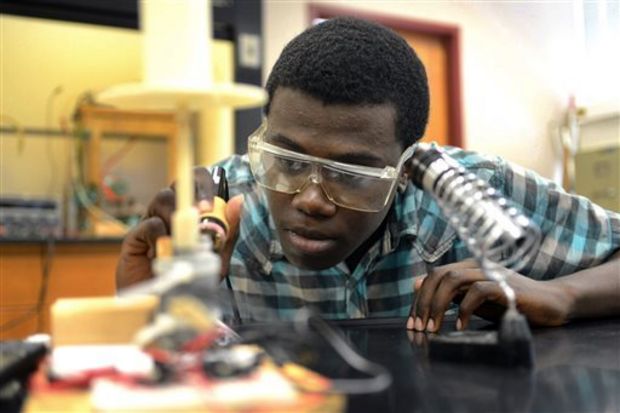

COLUMBUS, Mississippi (AP) — Mississippi School for Mathematics and Science graduate Donely Gunn of Columbus is a whiz at many things — like engineering and electronics.
He recently returned from the International Science and Engineering Fair in Los Angeles, California, where he presented his project, “Optimizing Small Vertical Axis Wind Turbines for use in Underdeveloped Countries.” Or put another way, “Can the Cellphone Help End Global Poverty?” which is the title of an article that first got wheels turning in Donely’s mind.
His goal was to build a device capable of charging small electronics, specifically cellphones, in nations that lack the infrastructure taken for granted in the U.S.
The work involved anemometers, airfoils, special software, torque assessments and 3D printing. To the average eye, however, his creation looks like so many small pieces of plywood and an assortment of batteries and wires. But add some wind, and the rudimentary apparatus can change lives.
“Cellphones can be used for so many things, things that some people in America may not appreciate or realize how important it is,” said Donely, who attended New Hope High School before MSMS.
With a cellphone, a farmer in rural Ecuador, for example, could call markets to determine where his produce would fetch the best price. He could even act as a central sales agent for other growers in his village, finding buyers, getting crop advice — improving the community’s economy in the long run. But a cellphone without a way to charge it is useless.
“I wanted to make (the device) as simple and as affordable as possible, so it could be made available to as many people as possible,” said Donely.
He pointed to a small element on the charger.
“I paid a dollar for this at Dollar Tree,” he said.
All told, he built the device for about $5.
MSMS physics instructor Jed Leggett assisted with the science and electronics as Donely developed his idea. Biology and chemistry instructor Don Bratton helped with presentation and accompanied Donely and MSMS student Austin Li to Los Angeles.
“It’s certainly a blessing to have students who are so motivated and driven. On the other hand, it’s a challenge,” said Bratton, describing the task of steering gifted young people to test themselves in the pursuit of independent work.
Independent thinking comes naturally to Donely: When he finished building the charger — using a 3D printer at Mississippi State University to create the turbines — he decided to build his own 3D printer. That technology, too, can have widespread uses in less developed regions.
Barbara Gunn began to get an inkling of her child’s precocious ability when Donely was just 4 or 5 years old.
“I noticed he liked to put stuff together and take it apart; he’d make things out of paper and Popsicle sticks. He always loved to read and he loves to learn,” she said.
Donely remembers working as a youngster on his grandmother’s small farm in Macon, alongside his uncle.
“He’d show me things like changing the oil, or changing an alternator or fixing a tractor — anything hands on, I was really interested in it,” he said.
He recalls being surprised to later realize those skills could lead to compensation.
“This was a real job? I thought we were just doing it for fun.
“It really inspires me to pursue the idea that I could create something simple that can affect great change in someone’s life,” he said.
Donely’s passion for learning has led to awards and honors too numerous to list in full.
He has been named a Gates Millennium Scholar, receiving a generous scholarship for tuition and expenses for as long as he is in school, funded by the Bill and Melinda Gates Foundation. He has also been awarded a large merit scholarship to his college of choice, Harvey Mudd College in Claremont, California. Donely is the recipient of a Junior Auxiliary of Columbus scholarship, as well.
The senior’s wind turbine project won Best of Show at the state Science and Engineering Fair. It was also selected as one of the top six — out of an initial 1,050 eligible projects — at a May 15 awards ceremony hosted by the Department of Human Development, Education and Employment of the Organization of American States, an organization of 35 countries from North and South America. He was the sole honoree from the continental U.S.
As one of two Mississippians invited to the National Youth Science Camp in West Virginia this summer, he will attend seminars on everything from genetics and physics to computer science. At some point in his future, he would like to start an engineering firm in Mississippi.
Donely praised the academic climate at the two-year residential high school for gifted 11th- and 12th-graders on the Mississippi University for Women campus.
“The teachers foster creativity, give you the ability to tinker, allow you to figure it out on your own, to work through the process and grow,” he said. “They don’t limit you. It’s like OK, let’s see what you can do; and the trust and support they give you is vital.”
In July, he heads west, to college in California. His mother will reluctantly say goodbye.
“I’m going to be happy, and I’m going to be sad,” she said. “I think the Lord has been working on me, trying to prepare me for him being away. But I’m happy for him because he’s just worked so hard to get where he is now.”
(Jan Swoope of the Commercial Dispatch wrote this report.)



